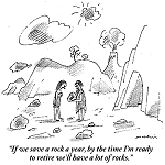The emotional behavior of investment crowds.
benhctan
Publish date: Sun, 16 Jun 2013, 11:39 AM
Investors always behave perfectly rationally, in their own best interests hence emotions are the root cause of the vast majority of these price changes.
 The world is full of rational, informed, iron-willed, self-interested, consistent, and efficient actors.
The world is full of rational, informed, iron-willed, self-interested, consistent, and efficient actors.
Behaviorial finance, on the other hand, recognizes the obvious: That investors are often influenced by emotion, and that therefore they make illogical, inconsistent, and ill-informed decisions, despite their best intentions to act in their own self-interest.
It turns out that we humans have several tendencies that don't help very much when we are investing. They skew our judgment.
Here are the most common traits that lead to investor self-sabotage:
--Failing to realize that the loss of an "unbooked" gain really is a loss. Some investors only think it is a loss if their account falls below what they originally invested. They view an intermediate gain as not real, sort of like playing with house money. Sorry, it was yours, and if you didn't book it, you lost it.
 --Failing to book a loss on a hopeless investment, hoping that it will come back. This is called loss aversion--people do not want to admit having made a mistaken investment. Apparently, people feel more pain from a loss than joy at an equivalent gain. They want to avoid regret over the loss, so they just don't book it.
--Failing to book a loss on a hopeless investment, hoping that it will come back. This is called loss aversion--people do not want to admit having made a mistaken investment. Apparently, people feel more pain from a loss than joy at an equivalent gain. They want to avoid regret over the loss, so they just don't book it.
--Failing to take on enough risk, and thus investing too conservatively. Over many years, the most conservative investments (such as fixed deposits) do not keep up with inflation. Thus what seems most conservative actually bears more risk: the loss of purchasing power to inflation as the years pass by.
--Not accepting a loss as the sunk cost it really is. This "sunk cost fallacy" keeps you focused on the past and diverts attention from what you can do now to get better results in the future.Anchoring on irrelevant data.Embracing certainty though it's irrelevant.
--Selling winners too soon (to lock in profits, thus creating a feeling of victory), but holding losers too long (waiting for them to get back to even so that there is no loss to regret).
 --Forgetting that the real goal of investing is to build wealth as effectively as possible, not to justify decisions you've made in the past. This can lead you to fail to evaluate your current investments on their potential to produce gains from this point forward, which at any given time is the important question to ask.
--Forgetting that the real goal of investing is to build wealth as effectively as possible, not to justify decisions you've made in the past. This can lead you to fail to evaluate your current investments on their potential to produce gains from this point forward, which at any given time is the important question to ask.
--Becoming paralyzed by too many options. This inability to make "choice under conflict" leads to taking no action at all when action is called for.
--Resigned acceptance of the status quo.
--Ignoring long-run "background odds" in the face of more immediate or newsworthy information.
--The difficulty in changing an opinion about something once an opinion has been formed, even if the opinion is only subconscious. This causes incoming data to be processed selectively, with supportive information being favored and contradictory information downplayed or even ignored. The end result is reduced objectivity.
Obviously, an investor who is subject to any or all of the foregoing traits cannot be totally rational, even if he or she is trying to be.
The Sensible Stock Investor needs to be as rational as possible, because over time, the stock market tends to reward rational decisions.
That is, the market tends to move stocks towards their intrinsic values. For example, if you paid too much for a stock, over time the market will reduce your returns from that stock or even turn them into actual losses as it brings the price of the stock back to what it is really worth.
Regretting the loss, failing to accept the sunk cost, holding onto the loser too long, failing to look ahead rather then back, and/or resigned acceptance of the status quo obviously do not help you make the best decision in this situation.
 Fortunately, we humans can counteract some of our psychological tendencies by using the left side of our brain with the aid of smart tools and processes when we are making investment decisions. Such tools and processes would include:
Fortunately, we humans can counteract some of our psychological tendencies by using the left side of our brain with the aid of smart tools and processes when we are making investment decisions. Such tools and processes would include:
• A standard system for evaluating whether a company is a good company
• Calculating a well reasoned number as a fair price for its stock
• Resolving never to make snap judgments on fragments of information or hot tips
• Writing out your investment goals
• Taking into account your unique situation, including honestly assessing your appetite for risk
• Choosing a strategy that is likely to lead to achieving your goals without making you uncomfortable
• Making, periodically updating, and using a "shopping list" of investments that meet your criteria; and
• Systematically reviewing your holdings with an eye to the future.
In the end, you want to apply your intelligence and objectivity to overcome self-defeating emotional tendencies in your investing. Left-brain-based systems and processes can help you to do that.



















choolooi
Helpful and informative advice. Shall try to be as rational as possible.
Thx for bringing things into focus after the past few days
2013-06-16 14:18